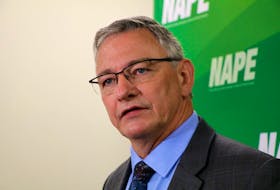Call it a shuffling of the deck — the Royal Newfoundland Constabulary (RNC) and Royal Canadian Mounted Police (RCMP) have shuffled that deck by moving resources around, but are still targeting crime as they always have.
It just comes in a different form following an announcement Thursday afternoon, when a collective plan to ensure effectively combatting serious crime, drug trafficking and child exploitation was revealed at a joint media conference at RNC headquarters in St. John’s.
RCMP Chief Supt. Garrett Woolsey and RNC Chief Joe Boland provided details about how the police will combat these types of crime.
The first change is the redeployment of officers who have worked in the Combined Forces Special Enforcement Unit (CFSEU), for the last five years.
Those officers will return to their duties with their respective police force.
“Essentially, what this means is that the RNC and RCMP will continue to work closely, but not within the structure of CFSEU, allowing the targeting of police to best combat crime to keep our communities and province safe,” Woolsey said.
“It is important that we put the right resources in the right places at the right times. I thank the police officers who were involved in CFSEU for their hard work and successes, and look forward to their continued contributions.”
Both Boland and Woolsey say that through a more collaborative work agreement, both forces will have more flexibility to target specific crimes.
Several former CFSEU officers will form a new drug unit within the RNC to combat street-level illegal drugs and associated crime, while others will be deployed to the RCMP federal policing unit, adding to the team there to combat serious and organized crime.
“As our community changes and evolves, so does the complexity and nature of crime. It is critical that we as police constantly evaluate and enhance our response to meet the changing needs of our communities,” Boland said.
“The new RNC drug unit will target street-level drugs with the objective of disrupting the illegal drug trade that continues to be a serious problem within our community. The RNC remains focused on making Newfoundland and Labrador a safer and healthier place to live, work and raise families.”
An area that will not change is the internet child exploitation (ICE) team.
“ICE will remain intact and will work as an integrated unit, including RNC and RCMP police officers, within the RCMP major crimes program,” Boland said.
ICE will continue to work province-wide, and be based out of three centres — St. John’s, Gander and Corner Brook.
Other joint police operations will continue to occur as investigations warrant.
Both Woolsey and Boland said CFSEU did great work with its dedicated officers. The change is not reflective of the work they did, but rather was made to use resources better to fight crime.
“There will be no job losses — no reduction in the number of police officers — as a result of these changes,” Boland said.
“It wasn’t that CFSEU didn’t work. There is a different need now than when it was formed.”
The change goes into effect Oct. 17.
RCMP, RNC disband CFSEU, announce changes to how police will combat serious crime, ICE remains

STORY CONTINUES BELOW THESE SALTWIRE VIDEOS








